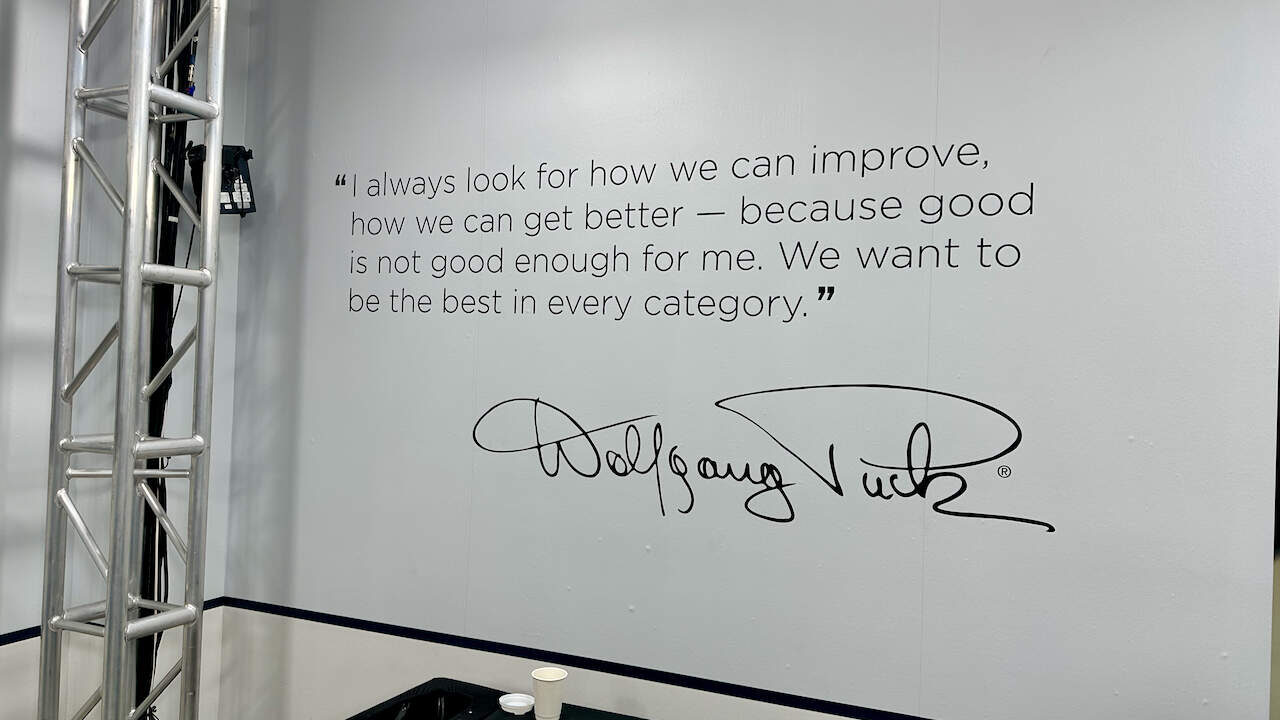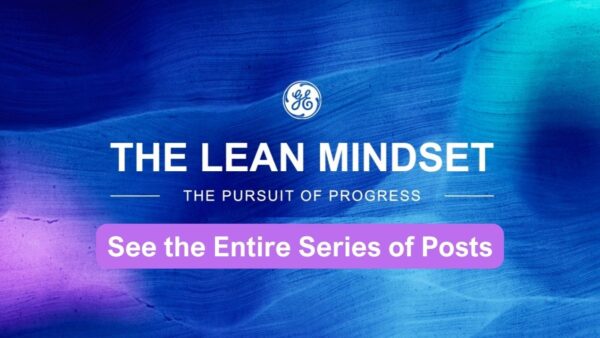tl;dr: In this post, Mark discusses key takeaways from the GE Lean Mindset events, particularly focusing on the diversity of backgrounds among attendees. He emphasizes how a varied set of perspectives contributes to a richer understanding and application of Lean principles, showcasing the universality and adaptability of the methodology.
I'll be writing many blog posts about the recent event, The Lean Mindset, organized by GE. Thanks again to GE for inviting me to be there and for giving away copies of my latest book, The Mistakes That Make Us, to attendees. See which books they gave away.
Today, I'll be writing about the event at a high level — what were some of the common themes that people discussed throughout the day?
Coming Wednesday, I'll be releasing a bonus episode of the Lean Blog Interviews podcast where you'll hear me, Jim Womack, Katie Anderson, and Jamie V. Parker chatting about the event — the immediate “postgame show,” if you will, that was recorded on sight immediately after the event.
If have the new optional Apple Podcasts Subscription to my Lean podcast, you can hear that discussion now, as part of the “early access” program for subscribers. You can get a 7-day free trial… or, again, it will be freely available come Wednesday morning.
The recordings from The Lean Mindset event are available here
The people who participated on stage weren't giving talks or speeches. They were in conversation with one or two other people. I'd like to see more of that format at Lean Events — less PowerPoint, more conversation, especially if you're able to incorporate questions from the audience (which this event did not).
The participants could be categorized in various ways… I can put them in buckets as CEOs and non-CEOs. The links go to their videos.
CEOs
- PETER ARDUINI, President & CEO, GE HealthCare
- LARRY CULP, Chairman & CEO, GE and CEO, GE Aerospace
- JIM FARLEY, President & CEO, Ford
- DARA KHOSROWSHAHI, CEO, Uber
- DR. TOM MIHALJEVIC, MD, CEO & President, Cleveland Clinic
- PATTI POPPE, CEO, PG&E
- WOLFGANG PUCK, Chef & Restaurateur (I'll call him a CEO)
- VICENTE REYNAL, Chairman, President & CEO, Ingersoll Rand
- SCOTT STRAZIK, CEO, GE Vernova
Great Leaders From Various Professions
- GIANNIS ANTETOKOUNMPO, NBA Athlete, Co-Founder & Chairman Ante Inc.
- CAROL DWECK, Psychologist & Author (author of the fantastic book Mindset)
- DAVID GELB, Director, Producer, Writer (including “Jiro Dreams of Sushi”)
- LAURA KAVANAGH, NYC Fire Commissioner
- ADMIRAL (RETIRED) BILL LESCHER, 41st Vice Chief of Naval Operations
- DR. LISA YERIAN, MD, Chief Improvement Officer, Cleveland Clinic
You have people on this list with advanced degrees, such as PhD and MD, and also Wolfgang Puck who dropped out of formal schooling at the age of 14 to become a culinary professional.
But, as I learned early in my career, at GM, a person with a lack of formal education can still be incredibly smart and curious. Wolfgang Puck seems like a life-long learner, as he mentioned attending an entrepreneurial management program at the Harvard Business School and that's where and how he met Larry Culp (when Culp was teaching there between his CEO roles at Danaher and now GE).
After Puck had been on stage, I saw him walking by carrying a copy of one of the Lean management books that Larry Culp recommends (and was being given away by GE) — Leading the Lean Enterprise Transformation by George Koenigsaecker. To me, that shows a commitment to learning and a willingness to bring in ideas from other industries — and Puck is 74. He could be coasting, but he seems to keep striving for improvement.
And the drive for continuous improvement — the mindset that we can always be better — was certainly one of those common themes throughout the day.
Wolfgang Puck's team provided catering services for the event and this sign was on display:

From what Puck said on stage, and to me during a brief morning conversation, I think that quote there isn't just an empty slogan. I'll share more about him in a future post.
Being an engineer, I cannot help it — I created a spreadsheet grid that mapped the speakers to some of the core themes from the day.
| Speaker | Safety Focus | Learn From Mistakes | Not Punishing Mistakes | Continuous Improvement | Go to Gemba | Growth Mindset | Problem Solving | Red is Good |
| Larry Culp Intro | x | x | x | |||||
| NYFD Comm. | x | x | x | x | x | |||
| Carol Dweck | x | x | x | |||||
| Patti Poppe | x | x | x | x | x | x | ||
| Jim Farley | x | x | ||||||
| Dara Khosrowshahi | x | |||||||
| Cleveland Clinic | x | x | x | x | ||||
| Giannis Antetokounmpo | x | x | ||||||
| Wolfgang Puck | x | x | x | |||||
| Ingersoll-Rand CEO and Ret. Admiral | x | x |
The themes:
Safety Focus
Is safety truly the top priority for the organization? Is safety for employees and customers (or patients in healthcare) the primary focus from which all other performance follows?
Learn From Mistakes / Not Punishing Mistakes
These mindsets go hand in hand, as I wrote about in The Mistakes That Make Us: Cultivating a Culture of Learning and Innovation. When leaders punish mistakes, it's really hard (if not impossible) for the organization to learn from them.
Continuous Improvement
Do you believe that everything can be improved? Do you engage everybody in that process every day?
Go to Gemba
Do you and your leaders try to solve problems from conference rooms and board rooms, or do you do to the place where the work is actually done — to listen, to understand, and to support your frontline employees?
Gemba (or Genba) is the Japanese that means, basically, “the real place” or the place, like a shopfloor or operating room, where value-adding work is done.
Growth Mindset
As Carol Dweck defines it, growth mindset is when people believe their talents can be developed through effort, coaching, and collaboration with others, as she said at the event.
Problem Solving
Does your organization teach and practice structured and rigorous problem-solving methods without being bureaucratic?
“Red is Good”
“Red is good” is the idea that we should be using poor performance (“the red”) as a driver for improvement instead of shame and punishment.
I'll share a few quotes and highlights from each theme in future posts. And, again, a lot of this is interconnected as a system… “Red is Good” means we can “Learn From Mistakes” when we “Go to Gemba” and “Problem Solve” to drive “Continuous Improvement” around Safety or other imperatives.
The event started with a “safety moment,” as all GE meetings do. This time, we had the honor of hearing from New York Fire Department Commissioner Lara Kavanagh, the first woman to have that leadership position.
She said:
“Safety is at the core of everything we do; it's a mindset.”
But, as with Puck, it doesn't seem like an empty slogan.
Continuous Improvement is a mindset. Lean is a mindset (or a series of mindsets).
There's so much to dig into with the videos.
Please post a comment on this post about anything that stood out to you from the videos or these themes.
Watch the Videos Via This Playlist:
Click the “1/10” in the upper right of the video player to see links to all 10 videos. Or press Play and they'll all play sequentially.
I'd suggest that you could watch these videos together as a team and discuss them as a series of hour-long lunch and learns, or similar type meetings. Or treat it like a “book club” and have people watch the videos and then come together to discuss…
More to come!
Please scroll down (or click) to post a comment. Connect with me on LinkedIn.
Let’s work together to build a culture of continuous improvement and psychological safety. If you're a leader looking to create lasting change—not just projects—I help organizations:
- Engage people at all levels in sustainable improvement
- Shift from fear of mistakes to learning from them
- Apply Lean thinking in practical, people-centered ways
Interested in coaching or a keynote talk? Let’s start a conversation.





![When Was the Last Time a Leader Around You Admitted They Were Wrong? [Poll]](https://www.leanblog.org/wp-content/uploads/2025/07/Lean-Blog-Post-Cover-Image-2025-07-01T212509.843-238x178.jpg)



![When Was the Last Time a Leader Around You Admitted They Were Wrong? [Poll]](https://www.leanblog.org/wp-content/uploads/2025/07/Lean-Blog-Post-Cover-Image-2025-07-01T212509.843-100x75.jpg)
